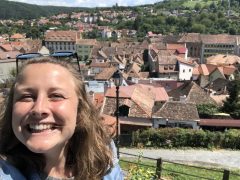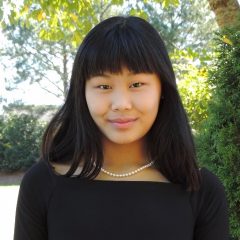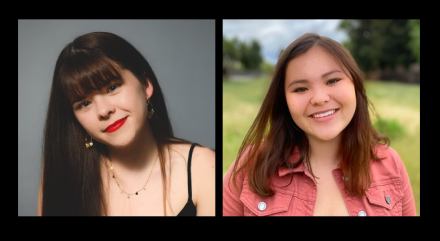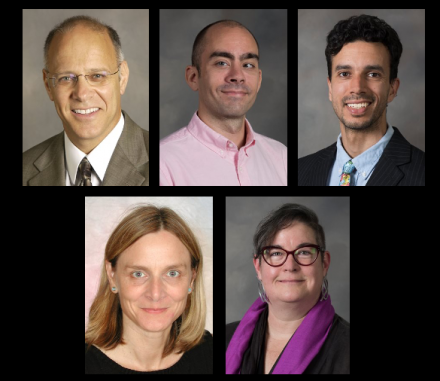The four winners of the contest, endowed by the late Philip L. Carret, were recognized during the English Department's annual awards ceremony.
Elon students Valerie Medlin ’20, Sara Moretti ’23, Maeve Riley ’20 and Malia Takei ’22 have been selected as winners of the 21st annual Philip L. Carret Thomas Jefferson Essay Contest.
The students who participated in this year’s competition responded to the following prompt in their essays:
The “Right of Expatriation” and the “Rights of Citizenship”: Jefferson and the Debate Over Immigration
Although immigration is one of the fundamental building blocks of the United States, it has also been a flashpoint in American history. How do Thomas Jefferson’s conflicting views on immigration illuminate later controversies? Consider debates about immigration and the current administration’s efforts to change U.S. immigration policy over the last several years. Bring one or more of the following quotes, or the ideas behind the quotes, into dialogue with current immigration policy debates:
- “Our ancestors…possessed a right, which nature has given to all men, of departing from the country in which chance, not choice, has placed them, of going in quest of new habitations, and of there establishing new societies, under such laws and regulations as, to them, shall seem most likely to promote public happiness.” — Thomas Jefferson: Rights of British America, 1774. ME 1:185, Papers 1:21
- “Although as to other foreigners it is thought better to discourage their settling together in large masses, wherein, as in our German settlements, they preserve for a long time their own languages, habits, and principles of government, and that they should distribute themselves sparsely among the natives for quicker amalgamation, yet English emigrants are without this inconvenience. They differ from us little but in their principles of government, and most of those (merchants excepted) who come here, are sufficiently disposed to adopt ours.” — Thomas Jefferson to George Flower, 1817. ME 15:140
- “We, like you, are Americans, born in the same land, and having the same interests. . . . Our forefathers were Englishmen, inhabitants of a little island beyond the great water, and being distressed for land, they came and settled here.” — Thomas Jefferson in a speech to John Baptiste Ducoigne, a Kaskaskias Chief, 1781.
The 2020 winners were honored during the English Department’s annual awards ceremony. The winners are typically honored at a banquet in the Center for the Arts, but that celebration could not take place this year because of the pandemic.
This year’s winners:
First Place: Valerie Medlin ’20
 Essay title: “Objects in the Rear-View Mirror are Closer than They Seem”
Essay title: “Objects in the Rear-View Mirror are Closer than They Seem”
Judges described Medlin’s essay as ” a fascinating read that is satirical, poignant and creative,” Medlin’s piece was also praised for the “quality of its writing and her detailing of how South of the Border iconography promotes stereotyping.”
Medlin received a $1,000 prize. The first-place prize also typically includes an all-expenses-paid trip to Thomas Jefferson’s home, Monticello, near Charlottesville, Virginia, but different arrangements may be made this year because of the pandemic.
Second Place: Sara Moretti ’23
 Essay title: “This Was Not in ‘Hamilton:’ Jefferson and the Debate Over Immigration”
Essay title: “This Was Not in ‘Hamilton:’ Jefferson and the Debate Over Immigration”
Judges described Moretti’s essay “as nicely detailed on implications of various policies and on the flaws of more restrictionist views.”
Moretti received the $500 second-place award.
Third Place: Maeve Riley ’20 and Malia Takei ’22 (tied)

Essay title, Maeve Riley: “All Men Are Created Equal: Some Exclusions May Apply: A Study of the History of Exclusive Immigration Policies”
Essay title, Malia Takei: “Thomas Jefferson: Man Of (Not All of) the People”
Riley and Takei split the $100 third-place prize.
The Philip L. Carret Thomas Jefferson Essay Competition is an endowed essay contest created in 1997 when Carret, a longtime New York investor, fell in love with Elon University after a visit to campus the previous year. Carret promoted the contest to have students reflect on the ideals and principles embodied in Thomas Jefferson’s life and career.

Judges for this year’s competition were Professor of Sociology Larry Basirico, Assistant Professor of Religious Studies Andrew Monteith, Assistant Professor of Sociology Raj Ghoshal and Professor of Art History Kirstin Ringelberg. The contest is coordinated by Professor of English Cassie Kircher and is part of Elon’s American Studies Program.


